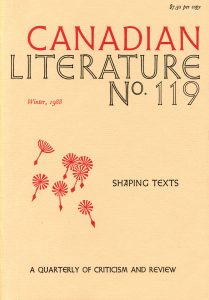Discovering Implicit Motivations in Canadian Literature Scholarship
When your instructors guide class discussion toward particular topics, or set assignment questions that encourage you to think about particular issues, they are implicitly teaching you what is of current interest in this field. As they guide your reading and thinking, they are inviting you to join the scholarly community in its ongoing conversation about pressing topics in Canadian literature studies. This chapter similarly invites you to further understand and participate in this scholarly community by highlighting some of the most frequently recurring and characteristic motivations that inspire professional scholars to make their arguments in this field. It explores how these motivations shape the development of articles in the field. And it will invite you to consider adopting these motivations in your own essays, or to see how you may have already started adopting them—perhaps even without realizing it.
Close Reading Poetry
Think of close reading as similar to a criminal investigation in which we, as readers, move slowly through the language and forms of the text, working through suggested connotations, subtle connections, and implications of terms and images. Our goal is to unravel the subtle riches of expression, to solve (or glimpse) the mystery.
Close Reading Prose
The goal of a close reading is to produce a convincing and thorough interpretation of a text. Even straightforward prose can contain a trove of literary devices and strategies to either guide the reader toward meaning or obfuscate meaning altogether. While close reading, it is not only important to understand what authors are saying, but also, how they are saying it.
Close Reading Journal Articles
Academic articles are scholarly conversations. They often reference and speak to each other and allow scholars to acknowledge, criticize, engage, learn from, disagree with, and add to each other’s ideas. This conversation happens between peers with a shared language, knowledge base, and training.












 ©
©